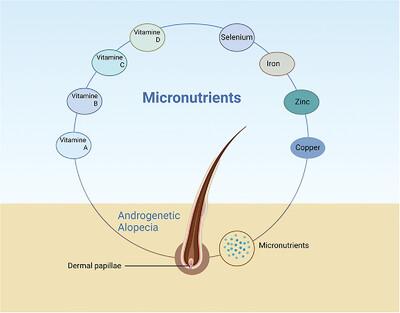当前位置:
X-MOL 学术
›
Mol. Nutr. Food Res.
›
论文详情
Our official English website, www.x-mol.net, welcomes your
feedback! (Note: you will need to create a separate account there.)
Micronutrients and Androgenetic Alopecia: A Systematic Review
Molecular Nutrition & Food Research ( IF 4.5 ) Pub Date : 2024-10-23 , DOI: 10.1002/mnfr.202400652 Ruilong Wang, Jinran Lin, Qingmei Liu, Wenyu Wu, Jinfeng Wu, Xiao Liu
Molecular Nutrition & Food Research ( IF 4.5 ) Pub Date : 2024-10-23 , DOI: 10.1002/mnfr.202400652 Ruilong Wang, Jinran Lin, Qingmei Liu, Wenyu Wu, Jinfeng Wu, Xiao Liu

|
Hair loss is a common problem that can negatively impact individuals' psychological well-being. Androgenetic alopecia (AGA) is one of the most prevalent types of nonscarring hair loss. This review summarizes the existing evidence on the relationship between AGA and various micronutrients, including vitamin B, vitamin D, vitamin A, vitamin C, iron, selenium, zinc, manganese, and copper.
中文翻译:

微量营养素和雄激素性脱发:系统评价
脱发是一个常见的问题,会对个人的心理健康产生负面影响。雄激素性脱发 (AGA) 是最普遍的非疤痕性脱发类型之一。本综述总结了 AGA 与各种微量营养素之间关系的现有证据,包括维生素 B、维生素 D、维生素 A、维生素 C、铁、硒、锌、锰和铜。
更新日期:2024-10-23
中文翻译:

微量营养素和雄激素性脱发:系统评价
脱发是一个常见的问题,会对个人的心理健康产生负面影响。雄激素性脱发 (AGA) 是最普遍的非疤痕性脱发类型之一。本综述总结了 AGA 与各种微量营养素之间关系的现有证据,包括维生素 B、维生素 D、维生素 A、维生素 C、铁、硒、锌、锰和铜。






























 京公网安备 11010802027423号
京公网安备 11010802027423号